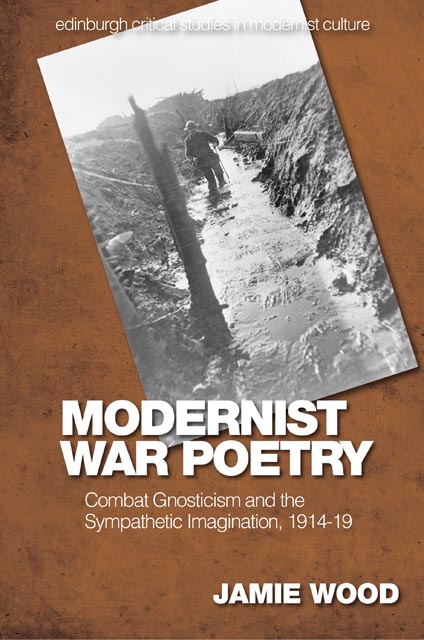Book contents
- Frontmatter
- Contents
- Timelines
- Acknowledgements
- Series Editors’ Preface
- Introduction
- 1 Early Modernist Responses to Combatant Poetry: 1914–Spring 1915
- 2 Reassessing Disaster: 1915
- 3 The Three Lives of Gnosticism: 1916–Summer 1917
- 4 An Emergent Critique of War Experience: Autumn 1917–Spring 1919
- 5 The Form and Practice of Modernist Distaste: Summer–Autumn 1919
- Conclusion
- Bibliography
- Index
1 - Early Modernist Responses to Combatant Poetry: 1914–Spring 1915
Published online by Cambridge University Press: 13 April 2023
- Frontmatter
- Contents
- Timelines
- Acknowledgements
- Series Editors’ Preface
- Introduction
- 1 Early Modernist Responses to Combatant Poetry: 1914–Spring 1915
- 2 Reassessing Disaster: 1915
- 3 The Three Lives of Gnosticism: 1916–Summer 1917
- 4 An Emergent Critique of War Experience: Autumn 1917–Spring 1919
- 5 The Form and Practice of Modernist Distaste: Summer–Autumn 1919
- Conclusion
- Bibliography
- Index
Summary
Modernist Poetics on the Eve of War
In The Problems of Philosophy (1912) Bertrand Russell suggested an ethical imperative to his examination of the basic principles of matter. If we are unable to verify the existence of a material object, Russell proposed, then all other material objects, including other people’s bodies and minds, necessarily collapse into a void, leaving us alone in a desert. Russell’s call for a cogent philosophy of matter in support of an ethics of otherness serves as a graphic reminder that the inevitably inward pilgrimage of early-twentieth-century aesthetics harboured a deeper strategy. Fredric Jameson has termed this work a ‘literature of inwardness and introspection’. However, in The Problems of Philosophy we can take note of the desperate need to break the legacies of what Walter Pater described in The Renaissance (1888) as ‘that thick wall of personality through which no real voice has ever pierced’. Russell’s modernism is a modernism negotiating with, to take Toril Moi’s apt phrase, ‘the death of idealism’. In David Perkins’s A History of Modern Poetry (1976) and Leon Surette’s The Birth of Modernism (1993) we discover a modernism grappling with the legacies of scepticism rather than a modernism inventing scepticism. As James Longenbach argues in Modernist Poetics of History (1987), it was Pater’s Plato and Platonism (1893) with its search for a form of permanent common sense independent of each personality which greatly influenced the early work of W. B. Yeats. As Russell intuited, to doubt the Other’s mind, to doubt our ability to conceptualise it in the same terms as we understand our own mind, is to believe certain things about the world with potentially horrifying consequences.
The established pre-war genealogy of modernist aesthetics has made the divisive and unstable impact of this encounter with epistemological scepticism abundantly clear. Take the broadly established genealogy of Ford Madox Ford’s literary impressionism for example. In the work of Joseph Conrad and Henry James this very distinctive fictional style turned to the investigation of subjectivity as the means to more accurately express how an individual truly experiences real events. In A Genealogy of Modernism Michael Levenson describes how, in the months leading up to the war, Ford’s early demand – most memorably in ‘Impressionism – Some Speculations’ (1913) – to register a public history in personal terms had eventually begun to give way under the weight of egoism.
- Type
- Chapter
- Information
- Modernist War PoetryCombat Gnosticism and the Sympathetic Imagination, 1914-19, pp. 24 - 52Publisher: Edinburgh University PressPrint publication year: 2022



